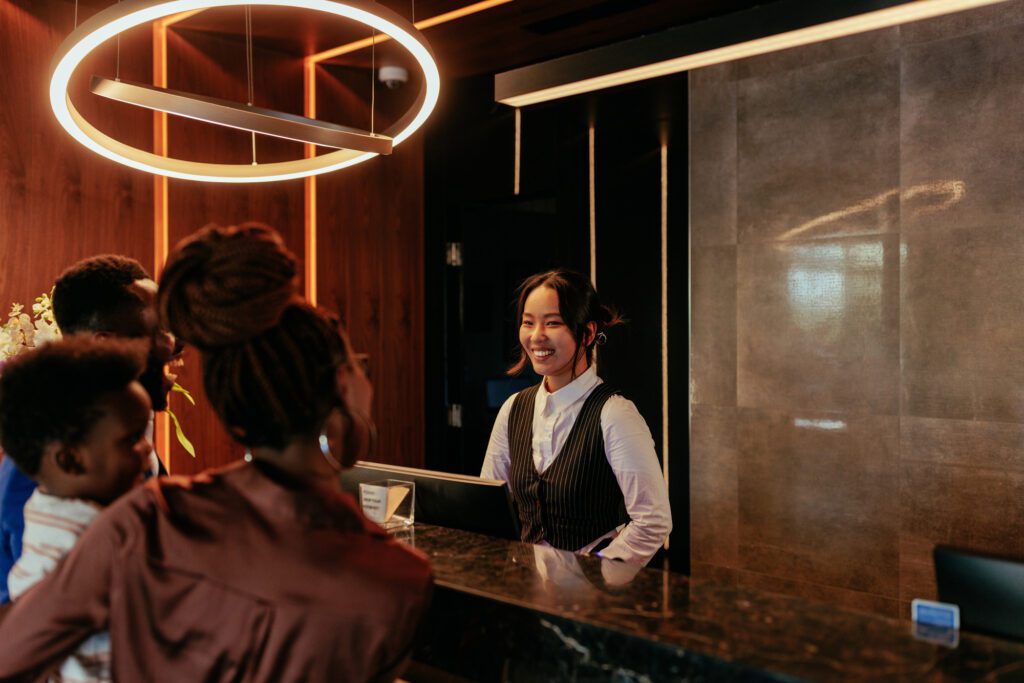Using effective communication for operational consistency and memorable guest experiences in hospitality
Communication is one of the three core pillars of frontline enablement. Unfortunately, it’s an often overlooked need in a fast-moving, competitive industry like hospitality.
While training lays the foundational knowledge so hospitality teams can get things done and task management provides them with clear direction to stay on track, communication acts as the bridge that connects workers to the company’s direction and provides a sense of community.

Dusting off the lines of communication between HQ and the hospitality frontline takes the pressure off breakroom bulletin boards and inefficient team huddles to deliver essential information from corporate. But the benefits of effective hospitality communications go far beyond sending workers an email blast with the latest updates.
Nailing communications is critical to take your teams to the next level, enable them to solve problems faster, share innovations and efficiencies and deliver memorable moments that create loyal guests.
How? Let’s dive in.
Consistency through communication
Reaching associates and their managers with relevant communications has been a long-time challenge in the hospitality sector.
Hospitality organizations need help getting communication right, even if they think otherwise. Our research discovered that while 62% of corporate leaders in hospitality believe their communication is effective, less than half of workers agree. This disconnect rings especially true for multi-brand hospitality organizations with massive frontline teams that need to remain engaged and informed but are up against logistical and language barriers.
Communication breakdown is just as common going in the other direction. Less than half of hospitality associates feel heard when they come to work and often want open feedback channels to communicate their concerns. When a team struggles to feel seen, heard, connected or appreciated, employee satisfaction (and the guest experience) are at risk.
Hospitality leaders expect staff to deliver great experiences to guests and seamlessly complete their daily tasks, without ensuring they’ve received key instructions or updates. These oversights open the door to liability and other guest service red flags.
A modern approach to communication means circulating relevant and real-time updates across the entire workforce and including critical information about how to best serve guests—regardless of how dispersed the workforce is. It also ensures that everyone who needs to get the message actually gets it. Improving the reachable rate of employees with effective communication, in the language or regional perspective that’s the most relevant, is one of the best ways to get teams on the same page and ready to consistently deliver your standard of service.
What good communication looks like in hospitality
What does effective employee communication look like?
For an industry like hospitality, it can take many forms: broadcast messages, nudge reminders, pulse surveys, social forums and more.
Start with where you’ll impact your team most and measure your communication efforts to tie them back to business outcomes. Not all communications solutions are created equal, so start with these basics for your associates:
- It allows company-wide or targeted information to be shared with the right audiences at the right times.
- It should contribute to a stronger employee community and fuel collaboration.
- It should open feedback channels for guests and employees so that good suggestions are always acknowledged.
5 ways effective communication can maintain operational consistency
Now that we’ve defined what effective communication looks like, let’s dig into how it works to maintain operational consistency and drive memorable guest experiences:
1. It provides the “why”
Hospitality workers want to be in the know at work. But they need to be shown the “why” behind what they do to understand how certain corporate decisions are made. Embedding a complete picture of their “why” within existing training materials can be tricky, so communications can bridge that gap.
2. It captures guest feedback…
There are many ways to hear from your guests, but one of the best ways is through the source that interacts with them daily: your people. A well-executed communication strategy captures your teams’ feedback and delivers it to the right ears so corporate can put changes in place that improve the guest experience, no matter the scale of the business.
3. …And great ideas
Your frontline is another excellent resource for learning how to do things better. Encourage them to share and capture their ideas, best practices and concerns to optimize processes. How many problems you’re able to identify before they become major barriers might surprise you.
4. It contributes to a loyal and engaged workforce
Creating a connection between workers and head office boosts morale and drives loyalty. Less turnover, less consistency risks.
5. It fosters a connected community spirit
Great communication strategies bring workforces together, no matter the size. Building that community helps to encourage camaraderie and a shared sense of purpose, both of which will enhance the guest experience. A strong employee community is good for business and leads to higher productivity, lower absenteeism and happier employees ready to deliver.
–
The most effective communications in hospitality flow both ways. Put an end to top-down messaging and provide your staff with additional avenues to share ideas and concerns directly with head office to ensure all feedback is tracked and saved from misinterpretation. Your associates and guests will thank you!